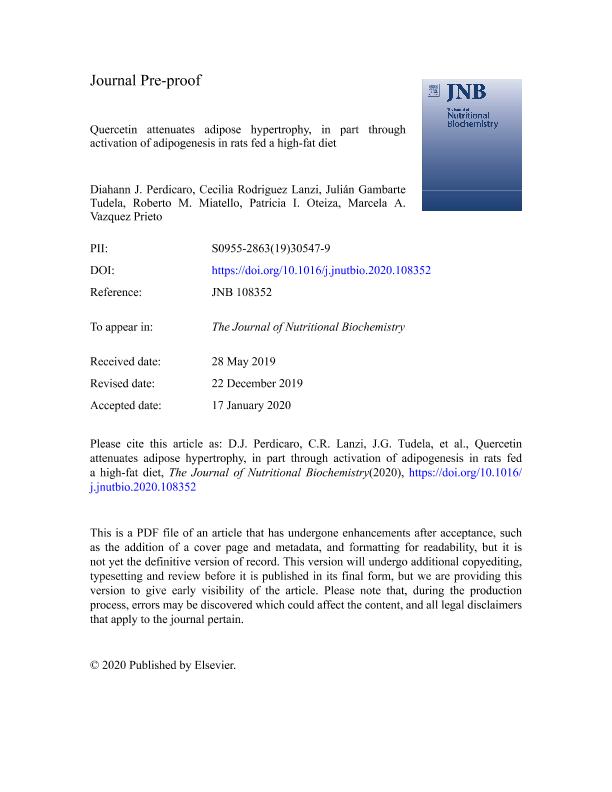Artículo
Quercetin attenuates adipose hypertrophy, in part through activation of adipogenesis in rats fed a high-fat diet
Perdicaro, Diahann Jeanette ; Rodriguez Lanzi, Maria Cecilia
; Rodriguez Lanzi, Maria Cecilia ; Gambarte Tudela, Julian Alberto
; Gambarte Tudela, Julian Alberto ; Miatello, Roberto Miguel
; Miatello, Roberto Miguel ; Oteiza, Patricia Isabel
; Oteiza, Patricia Isabel ; Vazquez, Marcela Alejandra
; Vazquez, Marcela Alejandra
 ; Rodriguez Lanzi, Maria Cecilia
; Rodriguez Lanzi, Maria Cecilia ; Gambarte Tudela, Julian Alberto
; Gambarte Tudela, Julian Alberto ; Miatello, Roberto Miguel
; Miatello, Roberto Miguel ; Oteiza, Patricia Isabel
; Oteiza, Patricia Isabel ; Vazquez, Marcela Alejandra
; Vazquez, Marcela Alejandra
Fecha de publicación:
05/2020
Editorial:
Elsevier Science Inc
Revista:
Journal of Nutritional Biochemistry
ISSN:
0955-2863
Idioma:
Inglés
Tipo de recurso:
Artículo publicado
Clasificación temática:
Resumen
An impaired capacity of adipose tissue expansion leads to adipocyte hypertrophy, inflammation and insulin resistance (IR) under positive energy balance. We previously showed that a grape pomace extract, rich in flavonoids including quercetin (Q), attenuates adipose hypertrophy. This study investigated whether dietary Q supplementation promotes adipogenesis in the epididymal white adipose tissue (eWAT) of rats consuming a high-fat diet, characterizing key adipogenic regulators in 3T3-L1 pre-adipocytes. Consumption of a high-fat diet for 6 weeks caused IR, increased plasma TNFα concentrations, eWAT weight, adipocyte size and the eWAT/brown adipose tissue (BAT) ratio. These changes were accompanied by decreased levels of proteins involved in angiogenesis, VEGF-A and its receptor 2 (VEGF-R2), and of two central adipogenic regulators, i.e. PPARγ and C/EBPα, and proteins involved in mature adipocyte formation, i.e. fatty acid synthase (FAS) and adiponectin. Q significantly reduced adipocyte size and enhanced angiogenesis and adipogenesis without changes in eWAT weight and attenuated systemic IR and inflammation. In addition, high-fat diet consumption increased eWAT hypoxia inducible factor-1 alpha (HIF-1α) levels and those of proteins involved in adipose inflammation (TLR-4, CD68, MCP-1, JNK) and activation of endoplasmic reticulum (ER) stress, i.e. ATF-6 and XBP-1. Q mitigated all these events. Q and quercetin 3-glucoronide prevented TNFα-mediated downregulation of adipogenesis during 3T3-L1 pre-adipocytes early differentiation. Together, Q capacity to promote a healthy adipose expansion enhancing angiogenesis and adipogenesis may contribute to reduced adipose hypertrophy, inflammation and IR. Consumption of diets rich in Q could be useful to counteract the adverse effects of high-fat diet-induced adipose dysfunction.
Palabras clave:
ADIPOGENESIS
,
ADIPOSE TISSUE
,
ANGIOGENESIS
,
INFLAMMATION
,
QUERCETIN
Archivos asociados
Licencia
Identificadores
Colecciones
Articulos(IMBECU)
Articulos de INST. DE MEDICINA Y BIO. EXP. DE CUYO
Articulos de INST. DE MEDICINA Y BIO. EXP. DE CUYO
Citación
Perdicaro, Diahann Jeanette; Rodriguez Lanzi, Maria Cecilia; Gambarte Tudela, Julian Alberto; Miatello, Roberto Miguel; Oteiza, Patricia Isabel; et al.; Quercetin attenuates adipose hypertrophy, in part through activation of adipogenesis in rats fed a high-fat diet; Elsevier Science Inc; Journal of Nutritional Biochemistry; 79; 108352; 5-2020; 1-8
Compartir
Altmétricas



